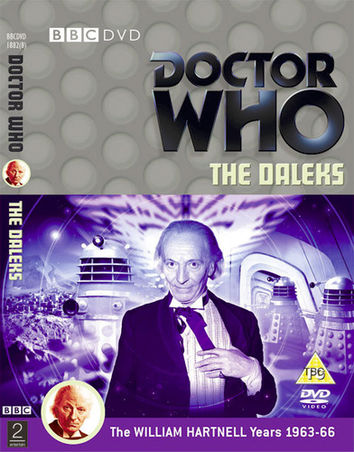
Aired 21 December 1963 – 1 February 1964
‘The Daleks’ is arguably the most important serial in Doctor Who because, despite how important setting up the characters and intrigue in ‘An Unearthly Child’ was, this story irrefutably proves the scope and breath that the format of the programme allows. By flinging the TARDIS crew far away from Earth and into the completely alien Skaro landscape, Doctor Who entrenches itself as a science fiction show while still targeting the family audience, along the way introducing the most iconic of foes, the titular Daleks with an immense cliffhanger that tantalizingly only teases at what lays at the other end of the advancing weaponry.
The Daleks have since, of course, suffered from overexposure precisely because of their popularity, and so it’s hard to appreciate just how much of an impact the ingeniously-designed Skaro initially had. With their jarring metallic staccato voices and terrifying weaponry that could be directed at anything remotely different, their force and might is apparent right from the start. For a family programme, the direct correlation of the Daleks- survivors of a nuclear war who wish to exterminate the also-surviving Thals and anything else in their path- to the Nazis is incredibly deep and shocking, but it paints them as true villains through and through.
The Doctor is once again written as a bit of an anti-hero, his arrogance and selfish desire to explore once more getting the best of him as he tricks his companions into believing they need to find a source of mercury to get the TARDIS working once again even though he knowingly has a functioning component in his pocket all along. William Hartnell once more proves adept at adding a bristling and sharp edge to his personality, eventually giving way to a degree of compassion and vulnerability as he realizes his mistake, becoming exposed to potentially lethal radiation in the process.
The extended running time of the serial does mean that there are some slower parts, and unfortunately many of these occur with the Thals, an initially pacifist group that eventually learns of the Daleks’ plans and sets out to stop them while also mounting a rescue mission. Although no particular Thal truly stands out from the rest and they come to terms with adopting a more resilient and forceful outlook on life, but Philip Bond, John Lee, and Alan Wheatley do lend an air of gravitas to a series of events that don’t always come off as the most dramatic. Along the way, William Russell and Jacqueline Hill get some standout scenes as well, once more proving that Ian and Barbara are the audience’s eyes and a necessary balance to the Doctor’s arrogance and ego.
The cold interior of the Dalek city as well as the alien landscape externally are both brought to life wonderfully by clever use of camera angles, an eerily engaging score, and negative video effects, showcasing the talent behind the scenes as well. With the imminent threat of such a dangerous foe and the creativity needed to defeat them, both flawed and more archetypal heroes who all undergo continued development, and an incredible atmosphere and state of tension, ‘The Daleks’ succeeds on many levels. It is every bit as important as any other story in the franchise’s history, setting the foundation for the alien and monster stories to follow but also telling a story suitable for any age, cleverly handling very mature concepts in a manner equally accessible to young children, the very point of Doctor Who in general. With the Doctor learning humility through the folly of his actions and realizing the importance of his human companions, however begrudgingly, the TARDIS team is beginning to truly come together, no matter how tenuous that bond may be.


Leave a Reply